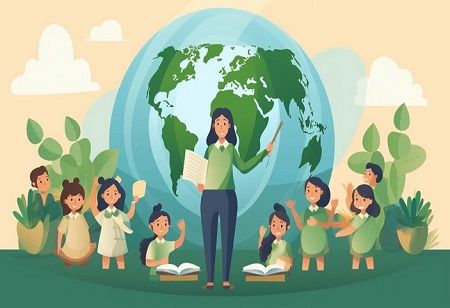-
In the journey to achieve the Sustainable Development Goals (SDGs), children often go unnoticed but play a dynamic role. Teaching them about environmental awareness from the beginning instills a strong sense of duty. Integrating sustainability into early childhood education is very powerful, laying the foundation for a generation naturally motivated towards sustainable living. The early years, from birth to eight, shape a child's thinking, behavior, and social interactions. During this charming period, each encounter shapes young minds into protectors of the planet's destiny. As children hold their surroundings and acclimate to the world, inspiring sustainable values fosters a natural inclination towards eco-consciousness. This early introduction to sustainability ingrains environmentally responsible behavior as an integral aspect of their lives.
Dr. Netra Neelam, Director, SCMHRD, says “With every new tenet of climate change unfurling, the commercial world looks towards taking into account the risk factors involved with ESG. Not only are financial institutions crunching environment-oriented risk calculations to mitigate long-term risks, but there has also been a conscious effort in the business circle to create green businesses”.
Can Sustainability Begin in Childhood?
Sustainability has risen as a pressing concern for our planet's well-being and the richness of generations to come. Sustainable practices look to succeed a delicate constancy between ecological health, social equity, and economic prosperity, ensuring a future where both current and coming generations can flourish. Early childhood education helps as the cornerstone of lifelong learning, highlighting the significance of inspiring sustainable principles in children from a young age. By familiarizing sustainability principles can cultivate a sense of accountability, compassion, and protection towards the environment and society. Also, it empowers children to begin as proactive global citizens, equipped to make informed choices that can positively shape the world.
In the domain of youthful imagination, there exists a remarkable chance to acquaint children with the concept embodied by SDG11 concerning Sustainable Cities and Communities. This objective strives to shape urban environments that are welcoming, secure, robust, and environmentally sustainable. Cities, being frontline battlers against climate change, beckon for the imaginative input of young minds. Engaging children in environmental endeavors and urban design not only tackles ecological challenges but also sparks the creation of vibrant, sustainable cityscapes straight from the canvas of their imagination.
Green Practices in Early Childhood Education
Infusing sustainability into early childhood education isn't simply an abstract notion; it's a practical attempt marked at nurturing young minds and fostering a deep connection with the environment. Here, a series of inventive strategies is unveiled for integrating sustainability seamlessly into the learning environment:
Creating Sustainable Learning Spaces: The design of learning environments embodies sustainability principles, utilizing natural materials, promoting recycling and up cycling, and providing opportunities for outdoor exploration. By integrating features like gardens or composting areas, children can directly interact with the wonders of the natural world.
Embracing Play and Inquiry-Based Learning: A safe and supportive atmosphere is fostered, encouraging curiosity and creativity through play. Children express themselves and engage in meaningful play experiences using recycled materials. Resources are collected from charity shops, car boots, and donations from parents, allowing children to explore the endless possibilities of everyday items.
Integrating Sustainable Practices: Sustainability is infused into daily routines and activities, teaching children about energy conservation, water preservation, and waste management. Basic actions such as switching off lights, conserving water, and recycling are introduced to young learners in a manner suitable for their age.
Collaborating with the Community: Learning extends beyond the classroom through partnerships with local organizations and community members. Visitors are invited to share their sustainability initiatives, fostering experiences such as tree planting or participating in community eco projects. These firsthand experiences allow children to witness collective efforts towards a sustainable future.
ESD in Early Childhood Education
Education for Sustainable Development (ESD) offers learners of all ages with the essential knowledge, skills, values, and empowerment required to challenge complex global issues such as climate change, biodiversity loss, resource overuse, and inequity. It tolerates individuals to make informed choices and engage in actions that change society and protect the planet. ESD is a constant learning process and a fundamental part of quality education. It enhances cognitive, socio-emotional, and behavioral aspects of learning and covers educational content and outcomes, teaching methods, and the overall learning environment.
The majority of early childhood educators lack familiarity with Education for Sustainable Development (ESD), often favoring nature and environmental education over it. Despite governmental efforts to promote ESD through guidelines and curriculum programs, many educators struggle with its complex social and economic concepts, finding them unsuitable for young children. To address this gap, research recommends systematic and varied training in ESD, which has been shown to enhance educators' understanding and confidence in incorporating ESD principles into their teaching. Professional development workshops play a crucial role in broadening educators' comprehension of ESD beyond environmental topics, encompassing societal, policy, and economic dimensions.
Disclosure
As the importance of sustainability in early childhood education is contemplated, educators identify their essential role in shaping young minds. By encouraging a sense of connection with nature, promoting social responsibility, and nurturing critical thinking skills, children are allowed to become active providers to a more sustainable world. The transformative journey towards sustainability begins within the limits of early childhood education centers. Educators embark on this voyage together, guiding young learners towards a future where sustainability is not merely a concept but an essential part of daily life.
🍪 Do you like Cookies?
We use cookies to ensure you get the best experience on our website. Read more...

